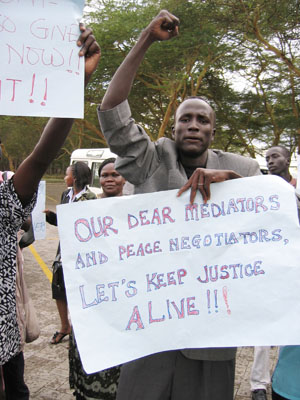
With the two referenda in Sudan a little more than 100 days away, the United States has recently taken the lead and made progress on critical negotiations regarding Abyei, a highly contested region on the country’s North-South border. Direct engagement by the U.S. is exactly what human rights and peace organizations have been asking for over the last year, to prevent renewed war and violence against civilians in Sudan. The U.S. once again is in a position to break the logjam on Abyei, as it did during the negotiations on the 2005 Comprehensive Peace Agreement, or CPA, which brought peace between the North and South after more than 20 years of war and 2 million deaths. When the two parties meet again early next month in Addis Ababa, we are hopeful that the administration will continue making progress toward the goal of on-time, free and fair, peaceful, and respected referenda.
On January 9, the people of Abyei are scheduled to vote in a referendum alongside the South. As the South votes on whether or not to form their own independent country, the people of Abyei will determine who they want to join—as stipulated in the CPA. However, whereas the South Sudan Referendum Commission, which is tasked with conducting the referendum in the South, is after much delay fully staffed and has finalized voter registration forms, the mere establishment of the Abyei Referendum Commission has been held up on the issue of membership criteria. Some of the other key items holding up the referendum in Abyei are the subsequent appointment and nomination of the members and agreement on criteria for voter eligibility.
Given that January 9 is just around the corner, many people in Sudan and elsewhere are greatly concerned that the referenda will not occur as scheduled and that Abyei, in particular, and the South will erupt in violence. In 1972, a similar referendum was promised to Abyei in the peace agreement which ended the first civil war between the North and South, but was never implemented.
It is not surprising that the ruling National Congress Party, or NCP, is making the Abyei referendum very difficult. First of all, the NCP wants to use the issue of Abyei to divide the Sudan People’s Liberation Movement, or SPLM. Khartoum knows that senior figures in the SPLM come from the region and are almost exclusively focused on issues related to Abyei, whereas many non-Abyei southerners don’t want their march to independence to be held up by it. Another reason is that the Sudanese government wants to use Abyei as leverage in post-referendum negotiations. They believe they’ll get more concessions in wealth-sharing, border, and citizenship issues if they hold it hostage, for political ransom.
As the negotiations move forward, the following four principles will be crucial:
- Implementation of all past agreements, including the CPA and the Permanent Court of Arbitration, or PCA, ruling on the borders of Abyei. The referendum should be held on-time and in a free and fair manner, and the outcome must be respected. The Abyei Referendum Commission should be established immediately.
- In particular, the parties should agree to respect the PCA ruling which recognizes that political boundaries do not prevent the traditional movement of migrating people.
- Residency criteria, which will determine voter eligibility, should respect international law and precedent.
- Independent monitoring of Abyei and other areas along the North-South border by the United Nations will be a key step in ensuring security before and after the referenda.
In the run-up to the conclusion of the CPA, the two parties were deadlocked on Abyei and couldn’t make progress bilaterally. African-led mediation deferred to the U.S., which rapidly and creatively brokered a settlement to the standoff. This opened the way for the conclusion of the North-South deal. Washington has already shown a clear commitment to promoting peace in Sudan during the high-level meeting at the U.N. last Friday, and we’re confident that it will continue to actively move the negotiations on Abyei along, critically breaking the standoff on Abyei yet again. As Obama said at the high-level meeting, “the fate of millions of people hangs in the balance.”

